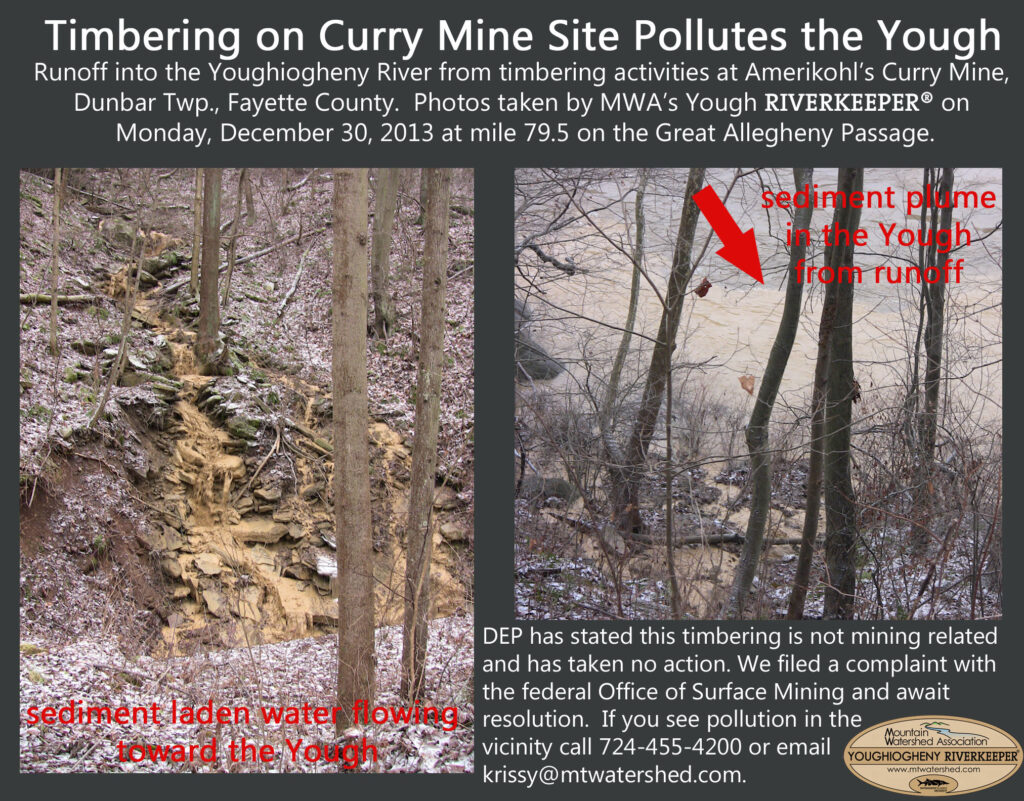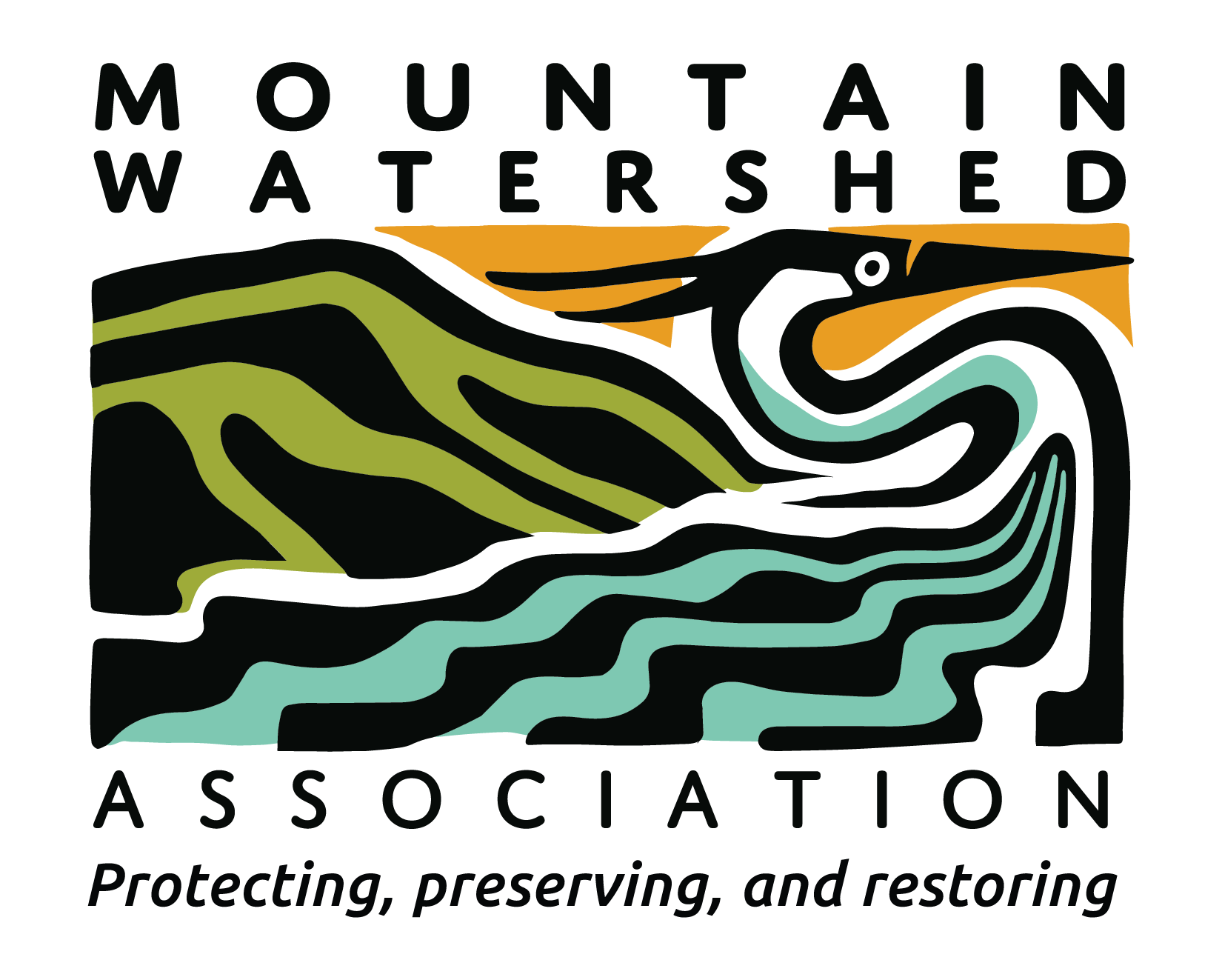We recently became aware of some significant erosion and sedimentation control problems on Amerikohl’s Curry Mine site in Dunbar Township, Fayette County (less than 1000′ from the high-quality portion of the Youghiogheny River and the Great Allegheny Passage). Longtime members and supporters will recall our challenge to the zoning special exception for this project. The Fayette County Zoning Hearing Board originally denied Amerikohl Mining a special exception for this site because of, among other things, the potential for the site to pollute the Youghiogheny River. Amerikohl appealed the decision, but the denial was later upheld by both the Fayette County Court of Common Pleas and Commonwealth Court. However, in 2012, Amerikohl reapplied for the special exception. The make-up of the Zoning Board had changed, and the new board approved the petition. By this time, the Department of Environmental Protection (DEP) had also issued the surface mining permit for the mine.
Late last spring our Yough Riverkeeper filed a complaint with DEP regarding sediment-laden water emanating from the site. DEP inspection documents show timbering was occurring on the site at the time though coal extraction had not yet begun. According to the DEP, this timbering was not related to the mining– despite it occurring within the boundaries of the permitted mine and complying with the Indiana Bat Protection and Enhancement Plan which was issued with the mining permit. The Fayette County Conservation District, which regulates timbering operations in Fayette County by requiring submittal of an erosion and sedimentation (E&S) control plan, has no record of an E&S plan being filed for this site. The district’s position is that this is a mining activity and should be regulated by the DEP mining staff. We filed a complaint with the federal Office of Surface Mining, and they issued a ten-day notice (TDN) to DEP (a ten-day notice is the process through which OSM initiates oversight over issues on mining sites permitted by states with OSM-approved programs– like Pennsylvania). Unfortunately, by the time OSM came out to conduct an inspection summer vegetation had grown in and the erosion had slowed or stopped. OSM vacated their notice.
Fast forward to December 2013. We once again began to receive complaints regarding a massive stream of sediment entering the Yough River in the vicinity of mile 79.5 on the Great Allegheny Passage. Our Yough Riverkeeper went out to investigate and take photographs. She filed a formal complaint with the conservation district, DEP, OSM & the Pennsylvania Fish and Boat Commission, who sent a Waterways Conservation Officer out to conduct an inspection. Apparently damaged erosion and sediment control structures from a timbering operation on the site were responsible for allowing the sediment-laden water to flow toward the river. Fish & Boat instructed the timber company to repair and improve the E&S structures. Erosion on the site has now slowed as a result of the improved structures. DEP maintains this is not a mining issue and that they have no jurisdiction. OSM has once again issued a ten-day notice to DEP, and DEP has requested a review of the notice.
 So, one important question remains… is timbering a mining activity or not? If a site is to be mined and the trees are cut in order to facilitate the mining, is this an activity which should comply with the erosion and sedimentation control plan in the mining permit? We believe so. OSM believes so. DEP disagrees, saying that until coal extraction begins on the site they are unable to provide any enforcement. Stay tuned, and in the meantime, if you’re paddling the river or pedaling the Great Allegheny Passage downstream from the lower Yough take-out/Bruner Run (approximately 1 mile below the pipeline crossing) please keep an eye out for erosion and sedimentation issues and be sure to contact us at 724/455-4200, ext. 2# or krissy@mtwatershed.com if you see anything unusual.
So, one important question remains… is timbering a mining activity or not? If a site is to be mined and the trees are cut in order to facilitate the mining, is this an activity which should comply with the erosion and sedimentation control plan in the mining permit? We believe so. OSM believes so. DEP disagrees, saying that until coal extraction begins on the site they are unable to provide any enforcement. Stay tuned, and in the meantime, if you’re paddling the river or pedaling the Great Allegheny Passage downstream from the lower Yough take-out/Bruner Run (approximately 1 mile below the pipeline crossing) please keep an eye out for erosion and sedimentation issues and be sure to contact us at 724/455-4200, ext. 2# or krissy@mtwatershed.com if you see anything unusual.

